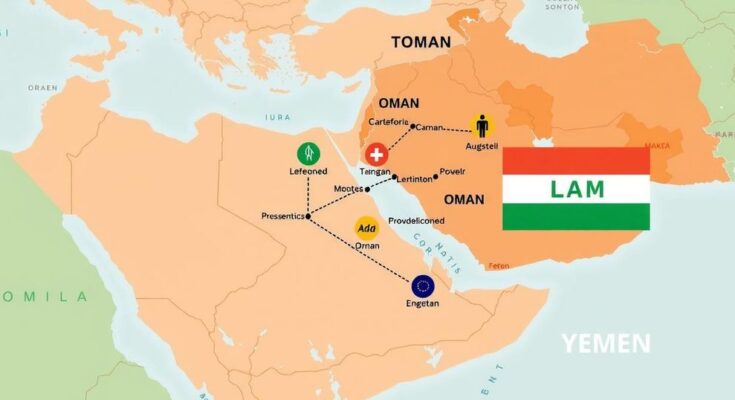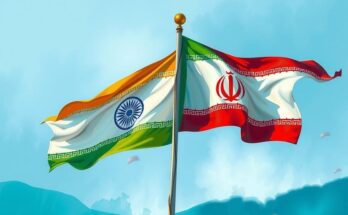The article discusses Oman’s covert role in supporting Houthi rebels in Yemen, highlighting its provision of safe havens and logistical support. It emphasizes the implications for international trade and security, urging the United States to reassess its relationship with Oman through diplomatic pressure, economic sanctions, and increased intelligence efforts. The focus is on curbing Oman’s involvement to enhance regional stability.
The geopolitical scene in the Middle East is escalating, highlighting Oman’s significant yet often unnoticed complicity in supporting Houthi rebels in Yemen. While Oman projects an image of neutrality from its capital, Muscat, its actions suggest a deeper involvement. The country has provided safe haven for Houthi leaders and has been implicated in supplying them with arms and logistical support, thereby exacerbating the conflict and threatening vital international trade routes.
Oman’s facade as a peaceful mediator belies its actions. It has allowed Houthi leaders, such as Mohammed Abdul Salam, to operate from within its borders, undermining its claims of impartiality. Reports indicate that Oman serves as a corridor for smuggling weapons to the Houthis, directly contributing to the movement’s military capabilities. This support is not merely passive but crucial to the Houthis’ ongoing warfare.
The repercussions of Oman’s involvement are significant. The Houthis, having gained strength from external support, now pose risks to global shipping, causing companies to alter their trade routes and incurring additional costs. Since November 2023, there have been numerous Houthi attacks on maritime vessels, leading to military responses from the United States, including airstrikes aimed at crippling Houthi operations.
The broader implications of the Houthi movement extend beyond regional boundaries, strengthening Iran’s network of pro-Iranian proxies and destabilizing the situation from Lebanon to the Gulf. Oman’s covert support for the Houthis plays a pivotal role in this larger scheme, demanding proactive measures from the United States to counteract this facilitatory support.
To address the issue, U.S. policymakers must reassess Oman’s role and apply diplomatic pressure to cease its aid to the Houthis. This includes imposing economic repercussions linked to Oman’s partnerships with America and enhancing intelligence cooperation to disrupt arms shipments. Increased scrutiny of Oman’s financial sectors and potential sanctions against entities aiding the Houthis are also essential to undermine their financial networks.
Moreover, a re-evaluation of U.S. foreign aid conditions to Oman is necessary, ensuring that military and economic assistance is contingent upon verifiable actions taken by Oman against Houthi support. Strategically, reducing dependence on Oman’s trade routes by fostering alternative logistics could diminish its leverage and encourage compliance with U.S. objectives regarding regional stability.
Oman’s concealed involvement in supporting the Houthi rebels has crucial implications for regional security and global trade. This necessitates a reevaluation of its diplomatic status by the United States and the implementation of measures to counteract its support for the Houthis. A multi-faceted approach involving diplomatic pressure, economic sanctions, improved intelligence operations, and oversight of financial transactions is essential in curbing Oman’s detrimental influence in the region and mitigating the ongoing threats posed by the Houthis.
Original Source: www.jpost.com




